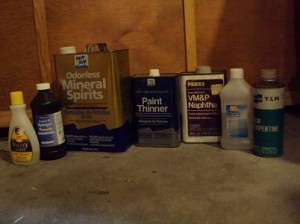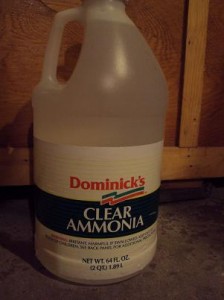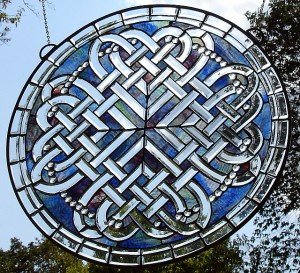Several weeks ago during a driving rain, a leak-spot appeared on an upstairs ceiling. Since the ceiling had recently been painted pristine white, the near-black stain was an eyesore. Finally, after many more rains and no new stains, it was time to paint over it.
First it had to be sealed. Among the toxic supplies in my basement was a product called B.I.N, something we’ve used in the past with 100% success. Billed as the “ultimate stain blocker,” the B.I.N did exactly as it promised.
As I was scraping off my foam brush on the edge of the can, suddenly it separated from its wooden handle and plopped into the B.I.N. Instinctively I grabbed it with my hand before it disappeared beneath the surface, making a terrible mess.
Luckily the can had been sitting on a protected surface, so no damage was done. Cleaning off my hand, however, was another matter. Standing at the basement utility sink, I started with soap and water but quickly realized B.I.N. was tougher than that.
So it was into the world of smelly toxins. I like using strong-smelling stuff since it gives my mostly-dormant nose something to do. Scrubbing first with paint thinner (didn’t work), I followed with turpentine (intense smell but also failed).
Reaching to the back of the shelf I found mineral spirits and naphtha. (Still nothing.) The upstairs medicine cabinet offered a few more options, so I scrubbed my hand with nail polish remover, peroxide and rubbing alcohol (to no avail).
Ironically, B.I.N. got rid of a ceiling stain but birthed a fresh stain on me. Deciding it would just have to wear off, I hammered the can shut and put it away, which is when I decided to read the label. Sure enough, help was right there in print: ammonia.
It worked like a charm, but when I put the bottle to my nose for one last sniff, even without much sensitivity, my nose said, “That stinks!”
A basement isn’t the only place where life can stink. Negatives come to all of us now and then, and bad news doesn’t discriminate.
For example, I remember the first time it occurred to me I was about to become a widow. Prior to that I’d only used that word in reference to Mom or elderly aunties. I knew only two widows my own age and hadn’t spent any time pondering widowhood for myself.
Then Nate got sick, and reality hit. Even though I was consumed with what each day would bring for him, the fall-out of his illness was going to mean widowhood for me. Every bit of it was hard to swallow. Or should I say hard to smell. It stunk.
But life’s stinky stuff is our best chance to smell good to God. We can rivet our attention on him rather than on our circumstances, and in some mysterious way, that morphs into a rich aroma for him.
And his sense of smell is flawless.
“Our lives are a Christ-like fragrance rising up to God… To those who are perishing, we are a dreadful smell of death and doom. But to those who are being saved, we are a life-giving perfume.” (2 Corinthians 2:15,16)






